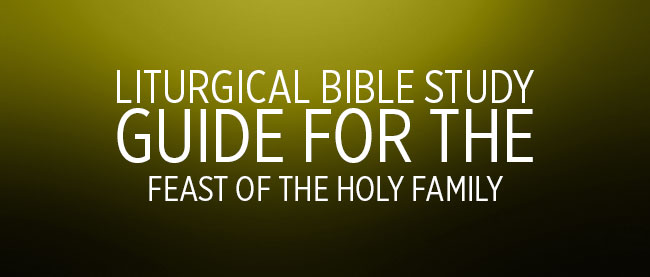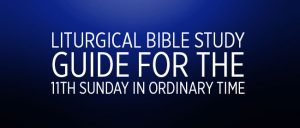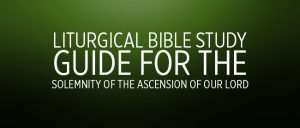Introduction
The Feast of the Holy Family honors the family group of Jesus, Mary and Joseph. This feast developed only in the 17th century. Built on the Gospel accounts, this family is looked upon as an excellent domestic unit representing the ideal family life. To promote family life and build up devotion to the Holy Family, a feast was established for the Universal Church in 1921 (under Pope Benedict XV), and it is currently celebrated on the Sunday after Christmas or on December 30 when Christmas falls on Sunday. There is an optional set of readings for the 1st and 2nd Readings, both are presented here.
1st Reading – Sirach 3:2-7, 12-14
Israelite wisdom, like the wisdom of other peoples, was the product of the scribal schools and the scribal class; this class first appeared under the monarchy and followed Egyptian models in administration and procedure. Wisdom is gained by counsel and instruction (Proverbs 1:5; 12:15; 13:14; 19:20f), and the young man is frequently admonished to accept instruction. Wisdom comes from association with the wise (Proverbs 13:20). The tradition of wisdom begins with primordial man (Ezekiel 28:12). The wise man accepts correction and instruction (Proverbs 9:8ff; 21:11); he is always learning, where the fool refuses to learn.
Israelite wisdom was modified by its relation to faith in Yahweh, which gives it a character of its own. Both Egypt and Mesopotamia had gods who were venerated for their wisdom, but these gods were specialists. Yahweh alone is truly wise; His wisdom is exhibited in creation (Proverbs 3:19; Job 38- 39).
Wisdom is a treasure which men cannot discover, for it is found only with God, who grants it to men. The wisdom of God is seen not only in His creation but in His management of human history (Job 12:13). Wisdom, while learned from tradition, is ultimately a gift of Yahweh (Proverbs 2:6).
The wisdom literature alone in the Old Testament directs attention explicitly to the problems of the individual person; it is free of peculiarly national traits and of messianism. Its merit is that it does draw attention to the importance of the business of daily life of the man who is not very important, and its emphasis on the fact that life is unity and integrity which must be preserved from the disintegration of folly is not misplaced. Today we hear Sirach tell us that fidelity to parents (the 4th commandment) is fidelity to Yahweh.
2nd Reading – Colossians 3:12-21
The purpose of Colossians was to bolster the faith of the community and correct errors reported about the church in Colossae. False teachers are at work in the community and since these false teachers are charged with “not holding to the head”, the errors must have arisen within the community. Jewish and pagan elements seem to be interwoven. The Jewish influence is evident in the references to observing suggested days, season, circumcision, and other Jewish practices (Colossians 2:16-17). In some circles of Judaism there was a strong belief in the mediatorship and power of the angels. The Qumran community attached a great deal of importance to the angel’s names and their roles in the affairs of the world.
The pagan influences at work in Colossae are reflected in beliefs that certain “elements of the world” or angelic beings were in control of the universe (Colossians 2:8,20). These “elements of the world” were a series of intermediaries between God and the universe. Each was considered to contain part of the “fullness of the Godhead” (Colossians 1:19; 2:9). They were the cause of creation (Colossians 1:15-17). They also shared control over various areas of the earth and over the destinies of men.
Paul had to counter the dangerous tendencies by pointing out the all-sufficiency of Christ in His role in the universe. He had to point out that the “fullness of the Godhead” was not shared by a multitude of intermediaries: all the fullness of God and His power was in Christ himself (1:19; 2:3,9). By His death on the cross, Christ had won a victory over all the forces that were considered to control the universe. In Old Testament wisdom literature Paul found proof that the whole universe had been created and directed by the wisdom of God from the beginning; now this wisdom had been fully revealed in Christ (Colossians 1:15-20).
In our reading today we hear Paul tell us some of the general principles for a life in Christ.
Gospel -Luke 2:22-40
Tradition tells us that Saint Luke was born in the Antioch of Syria. This suggests that he was of a Gentile rather than Jewish origin. This possibility appears to be borne out in Colossians 4:10-14 where Saint Paul singles some out as being “of the circumcision:” “Aristarchus my fellow prisoner greets you, and Mark the cousin of Barnabas … and Jesus who is called Justus. These are the only men of the circumcision among my fellow workers for the kingdom of God… Epaphras, who is one of yourselves… Luke the beloved physician and Demas greet you.”
When Saint Luke became a Christian is unknown, quite possibly it was very early in the formation of the Church, but he states very early in his gospel account that he was not an eyewitness to the life of our Lord. The Acts of the Apostles, which Saint Luke also wrote, show him as a disciple and companion of Saint Paul; with some events being reported in the first person plural, implying that he himself took part in them.
From the very beginning the Church has always regarded Saint Luke’s Gospel as a sacred book: it was used for liturgical reading and is found in the earliest lists of books which the Church considers to be inspired by God. In the fourth century, the Council of Laodicea (sometime between A.D. 343 and 381) stated that only certain books could be
read out in church and included in this listing were the “four Gospels according to Matthew, according to Mark, according to Luke, according to John.” The same regulations, with some changes in which books were included (so that they conform to what we know as the canon today), were issued by the Council of Hippo (A.D. 393) and the Council of Carthage (A.D. 397). It is believed that Saint Luke’s Gospel was written in the year A.D. 62 or at the
beginning of 63.
Almost half of the content of Saint Luke’s Gospel is not to be found in the other Gospels. Among the important items exclusive to Luke are: his account of Jesus’ infancy, his setting of many episodes of Jesus’ public ministry within the framework of a long journey from Galilee to Jerusalem, certain parables, and the account of the appearance of the risen Jesus to the disciples at Emmaus. Today we hear from his account of Jesus’ infancy.
Our gospel reading stresses the holy family’s strict obedience to the Law of Moses. Luke 2:21 says “When eight days were completed for his circumcision, he was named Jesus, the name given him by the angel before he was conceived in the womb.” The requirement for circumcision is found in Genesis 17:12. Circumcision is the sign of the covenant between Abraham and God, a mark which designates that they belong to God’s chosen people.
Although not mentioned in our gospel reading today, Exodus 13:11-13 requires the sacrifice of all firstborn males (either of the flock or the family), with the provision that donkeys and sons shall be redeemed with a lamb, or if not redeemed its neck shall be broken. Numbers 18:16 states that the redemption shall take place at the age of one month and places a price of five silver shekels (a shekel is about 112 grams or about $100.00 at 2012 prices) as the price of redemption.





